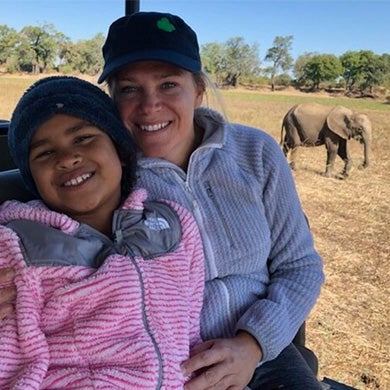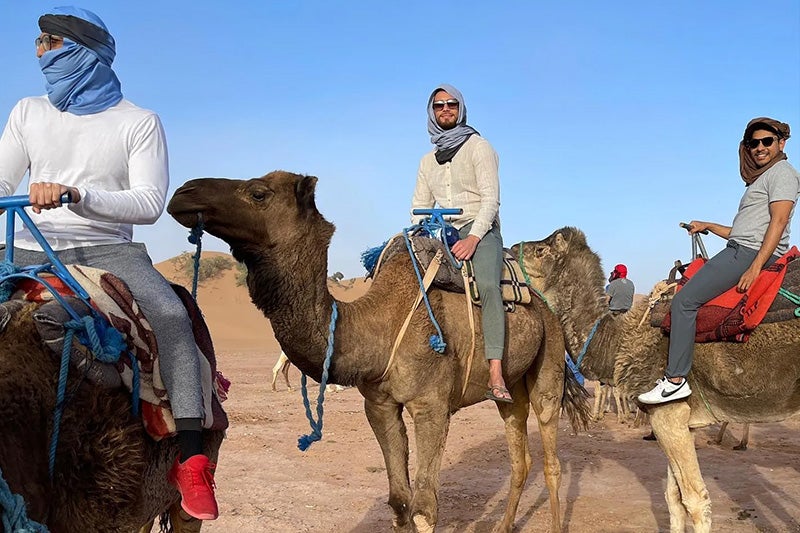What Will You Do on Your Summer Vacation?
What Will You Do on Your Summer Vacation?

- One in five U.S. jobs is directly or indirectly related to travel, to the tune of $1.9 trillion in economic activity
- The strong U.S. dollar is inducing Americans to vacation internationally, which won’t aid the domestic economy
- Forecast faculty director Jerry Nickelsburg says uncertainty of Federal Reserve policy decisions is leading to uncertainty in the economy
According to the U.S. Department of Commerce, in 2019, 1 in every 20 jobs in the United States was either directly or indirectly supported by travel and tourism, to the tune of 9.5 million American jobs and $1.9 trillion in economic activity.
Naturally, though, the industry was among the U.S. business sectors hardest hit by the COVID-19 pandemic and its associated health and travel restrictions, both domestic and international. The result: Leisure and hospitality lost 8.2 million jobs between February and April 2020 alone.
Now, with the pandemic settling in to an as-yet unsteady “new normal,” to what extent is travel spending — and, by extension, support of jobs across the tourism and hospitality sectors — recovering? Is the U.S. economy benefiting or are Americans more inclined to travel abroad? How do continuing pandemic, war in Ukraine and supply chain unpredictability affect travelers’ choices and options?
Professor Jerry Nickelsburg, faculty director of the UCLA Anderson Forecast, says that while the U.S. added 67,000 payroll jobs in leisure and hospitality in June (about one-third in accommodations), employment in those sectors is still below pre-pandemic levels. In California, he says, “Most of the missing employment is in the coastal cities — Los Angeles and San Francisco — that serve foreign tourists and people who are more subject to remote work.” And those foreign visitors, says Nickelsburg, aren’t arriving in droves, given the volatile situation in Ukraine and continued travel restrictions from China, in particular.
Meanwhile, the euro recently hit parity with the U.S. dollar for the first time in 20 years. Nickelsburg says this will induce Americans to take their vacation budgets overseas. “Americans seem to be ignoring the continuing pandemic and Ukraine war, and traveling anyway.
“The big uncertainty,” he says, “is the economic consequence of Federal Reserve policy. The Fed is in unchartered territory. Will it raise interest rates too fast? That would slow consumer demand but might also induce a recession. There’s some indication of commodity prices coming down, which may moderate Fed interest rate policy. But the impact of the Fed’s policy decisions is still unknown.”
One supply chain issue that is affecting travel is airline passenger capacity. Nickelsburg says that “airlines seem to have under-forecast the capacity they needed to bring online to meet demand. They didn’t bring back enough planes and staff. There are also labor shortages at some airports. These are important factors in the many flight delays and cancellations.”

Stacy Readal (’05) founded travel company Duma Explorer
Stacy Readal (’05), whose company Duma Explorer arranges trips throughout the East African region, warns of a higher instance of delayed luggage delivery as summer travel picks up, especially in connection with flights going through Europe and the Middle East. “Because of the major uptick in travel, the international airlines are struggling to cope,” says Readal. “I have been recommending that people pack their first few days of clothes in their carry-on luggage.”
Airports, too, are finding the influx of summer travelers difficult to manage. Witness the recent accumulation of “lost” luggage at London’s Heathrow, where airlines have been ordered not to book passengers through that airport until September and where a limit of 100,000 people per day will be admitted.
“Once you arrive in Africa, everything is okay,” Readal adds. “Unlike in the USA, most people in East Africa did not leave their jobs in the service industry in 2020. So, once you arrive here, things are very much like they were pre-pandemic. It’s a great place to visit right now! In Kenya and Uganda, tourism still seemed slower, but Tanzania is very busy.”
Travel marketing expert Lyle Seebeck (’23), co-president of Anderson’s Travel and Hospitality Association, is interning at Portland-based Modern Adventure. A certified B Corp founded by Luis Vargas (’09), the company customizes journeys around the world. “There’s a big market for curated experiences,” says Seebeck, who believes that through those experiences, “travelers have to become much more aware of their effect on places they travel to.” His advice for traveling Americans, particularly those heading into volatile regions internationally, is: “Be aware of people locally, and their customs.”

Left to right: Paresh Sovani (’23), Lyle Seebeck (’23) and Ahmed Khan (’22) joined a UCLA Anderson spring 2022 trek to Morocco
And if you’re not planning to travel so far afield? Forecast economist Nickelsburg says the bright spot in California is Sonoma and Napa Valley wine country, which has bounced back from interruptions in business since lockdown, not to mention wildfire. Arrivals at the regional Santa Rosa airport have reached pre-pandemic levels. And, although the price of gas will shorten the length of many Americans’ road trips, it’s an incentive to stay closer to home, injecting leisure spending into local economies.